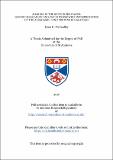Sharing in the son's inheritance : Davidic messianism and Paul's worldwide interpretation of the Abrahamic land promise in Galatians
Abstract
This thesis examines the link between Paul’s belief that Jesus is Israel’s Messiah and his interpretation of the Abrahamic land promise in Galatians. It counters claims that Paul replaces the Promised Land with the gift of the Holy Spirit or salvation. Instead, this thesis argues that Paul expands the inheritance to include the whole earth because he believes that, as the seed of Abraham and David, Jesus is entitled to the entire earth as his inheritance and kingdom. For Paul, then, God’s promise to Abraham will be fulfilled when believers share in the worldwide inheritance of the Son. This thesis demonstrates that scholars neglect Paul’s expanded interpretation of the inheritance because they rarely appreciate the role that messianism plays in Galatians. I contend that they fail to appreciate the role of messianism because they do not acknowledge a central point of contact between Jewish and Pauline messianism. This point of contact is that royal and messianic figures are often portrayed as God’s means of fulfilling the land promises through the establishment of their kingdoms. An examination of several second temple texts will show that authors often tie the actions of royal and messianic figures to the final realisation of the land promises. In many of these accounts, these messianic figures establish kingdoms that are worldwide. Turning to believe heirs is a manifestation of Second Temple messianism because Paul argues that faith in Christ is sufficient to allow believers to share in the inheritance that belongs to Christ as seed and Son. For Paul, that inheritance is the whole renewed earth. Thus, Paul’s interpretation of the Abrahamic inheritance is inseparable from his belief that Jesus is Israel’s Messiah.
Type
Thesis, PhD Doctor of Philosophy
Collections
Items in the St Andrews Research Repository are protected by copyright, with all rights reserved, unless otherwise indicated.

